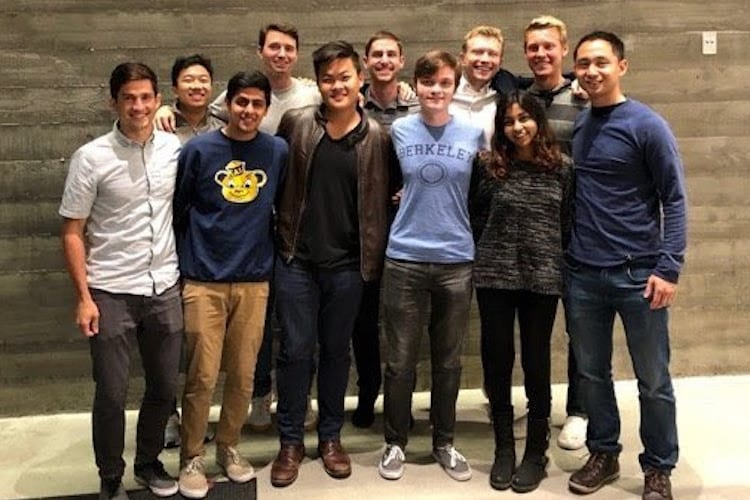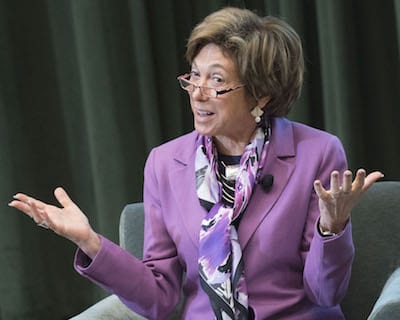
Artificial Intelligence experts debated the promise of smart machines as well as their potential to wreak havoc on the economy at last week’s pioneering Berkeley conference on AI and business.
The “AI: Shape the Future” event, organized by students from Haas and Machine Learning at Berkeley and held April 13 at Pauley ballroom, drew a crowd of more than 250 people. Haas Prof. Laura Tyson, who has written extensively about the impact artificial intelligence will have on jobs and the economy, joined AI experts and UC Berkeley Professors Michael Jordan and Andrew Critch as speakers. AI experts from Amazon, General Electric, and Google, along with Berkeley Haas Dean Rich Lyons and Information School Dean AnnaLee Saxenian, also spoke.
Uncertainty around the future of work
The discussions revealed a divide around how computer systems capable of intelligent behavior—such as visual perception, speech recognition, decision-making, and language translation—will impact the job market and the future of our world.

Tyson, the faculty director of the Institute for Business & Social Impact at Berkeley Haas and former chair of the US President’s Council of Economic Advisers, said she doesn’t worry that AI will cause mass unemployment. But she is concerned about the future of the job market overall and the quality of jobs that will be created due to new technology.
“The question is, as more and more intelligent machines can do better than humans at more and more jobs, what happens to societies that depend on income generation?” Tyson said.
Automation has already replaced many routine jobs, she says, particularly middle-income jobs, such as those in manufacturing, and lower-end tech jobs, such as data processing and basic coding.
In the future, she adds, the new jobs created by AI won’t necessarily be located in the places that are losing jobs to automation.
“The evidence shows concern about the quality of jobs that we will have left,” she said.
The conference was organized by three Haas students: AJ Christensen, MBA 19, Brian Polidori, MBA 19, and Daan Kakebeeke, MBA 18, who met through their interest in data science. The Haas students worked with Franklin Rice, BS 18, (electrical engineering & computer science), who is a member of the student group Machine Learning, and got additional support from the UC Berkeley School of Information as they set out to create a new conference that would bring business and engineering students together to explore AI through a new lens.
“You have engineers on one side who understand the machinery, and then you have business students who understand the world in which machine learning is being deployed, but don’t understand the machinery at all,” Christensen said.
“We’re bringing together diverse perspectives on AI from multiple corners of UC Berkeley and Silicon Valley to bridge this gap, break past the clichés and technical details, and help all students to start thinking about AI in a more comprehensive, nuanced, and thoughtful way,” Kakebeeke said.
AI technology is immature
The sessions focused on three areas: opportunity recognition in AI, the impact of AI on the economy, and new laws and policy.
Gert Lanckriet, head of machine learning at Amazon Music and professor at University of California, San Diego, said the growth of AI is fueled by the exponential increase in data that’s zipping across the internet.
“The more data, the better AI can be,” he said.
But Michael Jordan, director of the UC Berkeley AMPLab and an AI pioneer, argued that technology such as speech recognition and computer “vision” is still immature, lacking the understanding and creativity that humans are capable of. He warned that machine learning can sometimes do more harm than good.
“What we have as AI is not as far along as people think,” Jordan said. As proof, Jordan shared a story about how an AI-enabled machine misdiagnosed him with calcium buildup based on data compiled from other patients. The doctors used that data to recommend a dangerous operation. “Based on that (recommendation) I could have died,” he said. “Around the world that same day people got that same diagnosis, that same false positive,” and they may have had the risky operation, he said.
Critch, who co-founded the Center for Human-Compatible AI, warned that smart machines have the potential to wreak havoc, and asked how we will prepare as a society. “I see it as my job to prepare for the eventual arrival of AI that is generally smarter than humans or sufficiently smart to pose an existential threat in some manner,” said Critch.